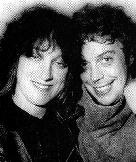
DIVA & DOCTOR
|
Diva Diaries
Dropping names
Carole, Sky (& myself)
"I'm quite shameless about namedropping," Carole says in Anti Diva's intro. It's true -- and quite fun. The index is most helpful. There's even a heading for "lovers," the list running nearly half a page.
On a quick scan you'll find there nearly four dozen household names -- and I mean US households. From rock notables (The Stones in a booze can off Bloor Street) to Rocky Horror (Tim Curry on the Toronto Island ferry) to sister divas (Divine, Lily Tomlin, Tina Turner, Alice Cooper) to pop culture gurus: a chat with Buckminster Fuller in bondage gear (she, not he); Marshall McLuhan in a mind-expanding dialogue ("There's nothing," Carole says, "as sexy as intellect").
The Second City crew, Martin Short doing Pierre Trudeau; Maggie Trudeau on the town at Grossman's. And of course Dusty Springfield, long Carole's lover. Saturday Night magazine ran nearly the whole chapter on Dusty.
Among the stars I have a sentimental fave: Kim Cattrall. She used to lived here, just down the street from Carole: "We literally bumped into each other one day and started hanging out." It's not just that she's fab on Sex and the City, but that she lets me drop a name. In 1979 Kim was acting in Tribute, shot here, with Jack Lemon and Robbie Benson -- teen idol of the day, "sensitive" variety.
I got to see Robbie shoot baskets at the Y. And, unbasketed, in the shower. Quite nice. (And no diva.)
Sky's book doesn't have an index. It should. It's a veritable encyclopedia of fringe theatre in Toronto over nearly two incredible decades; it will be thumbed -- too often in frustration -- for years to come in search of names not household (even in Canada).
Among people I found in Sky's world as well as my own, in Promiscuous Affections if not already noted above: Ed Jackson, TBP collective and Buddies' board member; Peter Day and Lawrence Bennett, arts administrators both and both also on the board, Peter lover to a good friend of mine, Lawrence a gay archivist -- and in 1970 my first overnight affair. Paul Leonard, once with TBP and with Buddies; his lover Bob Wallace, writing regularly for the paper on theatre, one of the few critics Sky can respect. And Sonja Mills, another Beeper following another, Sue Golding, into Buddies' presidency.
And, Sky tells us, he did almost do it with Rudolph Nureyev at The Romans.
Carole has performed at Buddies: in "Quiet Please, There's a Bitter, Petulant Diva on Stage," December 1995, and during a later Pride Week in "Carole Pope and a Bunch of People She's Slept With," Ashley MacIsaac by her side (I doubt she had, but who knows: the boy is kinky). Still, she and Sky never do mention each other. Can't imagine why....
Carole excuses her star citings: "I'm only following the example of Truman Capote and Dominick Dunne, two of my favourite writers." I'd say she needs no excuse. In fact I'm going to follow her example, if dropping just two names. One Sky would more than understand; Carole too. And she, especially, the other.

PICTURE PERFECT
(PERVERT)
Tim Guest; a shot I took at a demo against Anita Bryant, Allan Gardens, 1978
I knew Tim Guest on the Queen Street scene. At The Bev, there with his boyfriend Ron Gabe (aka Felix Partz of General Idea), Tony Malone revising a lyric in his honour: "Don't play with Timmy Guest, play with me."
On Richmond at the corner of Duncan, just up from The Body Politic at 24, as curator at Art Metropole. Across a table at the Peter Pan, resisting efforts by his editor -- me -- to make his words mine, not his own. Tim débuted TBP's "youth" column, The New Age, in 1978. Young queers were such a force at the time that we'd come to call homosexuals collectively "Lesbians, Gay Men & Gay Youth." (Mind you, Tim's ancient editor was just six years his senior.)
To me, Tim wasn't just on the scene. He was the scene, personifying it. "The very picture of the bright young thing -- in every sense," I called him in Promiscuous Affections, 1978. You'll find lots of Tim there.
I found him in Sky's memoir, if not quite as the Tim I knew. By the early '80s we weren't much connected anymore. I'd forgotten he shared 57 Homewood with Sky, and with Sue, she much more in my life then than Tim. For Sky, Tim was much more than a housemate -- as so many gay cohabitants not "couples" were then.
-
"Tim Guest was a very beautiful and political young fag. He was a Trotskyist, heavily involved in the art scene ... he certainly seemed to be one of the trendiest, prettiest and smartest cultural mavens on the Toronto scene. He was such fun to hang out with."
"Even though we pretended to be equals -- cute boys around town -- we weren't. Tim was a lot cuter than me. I used to joke about the fact that I felt quite invisible when we were out together. I could blend right into the woodwork. Guys were obsessed with Tim. He was slender, with perfect cheekbones and straight dark hair."
"He was very boyish. He looked a bit like one of those velvet paintings of children with the page boy haircuts and the gigantic round eyes. But inside he was a pervert. And what he liked best was making clean, preppy white boys get down and dirty."
Tim was also an artistic collaborator, one of Sky's apparently few links to the Queen West scene. Not many people show up in both Sky's book and Carole's, among them Patti Smith (as mutual inspiration), Sheila Gostick and The Clichettes. Carole recalls Tim with Felix Partz -- hoping for a threesome with scene starlet and FILE cover girl Anya Varda.
The worlds of Queen West and the "legitimate" (even if "alternative") theatre seemed little to overlap, at least in these accounts. For one of Buddies' Rhubarb! festivals, wanting to assure "its special status as a place for non-scripted and performance art work," Sky asked Tim, "with his unique sense of humour," to curate a week of art performance.
I had never known Tim worked with Buddies, or with Sky. I did know that he was later in New York, working on "artists' books." Not books by artists; see Michael Wade enlightening David Roche on the distinction in a yak at Buddy's (yakfest gay bar of the day) in Promiscuous Affections, 1982.
Maybe it was in return for a pearl of David's wit, offered just after they'd waved to Tim outside a short-lived scene-hangout on Peter Street, just down from the Peter Pan. Mikey recorded it in his journal on December 13, 1981.
-
"David is one of the few acquaintances whose creative work I pay attention to not just because I know the guy [and had had a brief affair with him], but also because I believe what he's doing is headed in directions worth keeping tabs on. (Gerald Hannon and Tim Guest are the only other two I can think of at the moment.)
"When leaving the Truck Stop, we see Mr Guest (again!), of whom David says: 'I know the guy's successful and all, but still, I don't believe I've seen him in class lately.'"
Maybe he was too busy with work. Real work I mean, not a job, like so many of us then doing what we most wanted but living on peanuts. Here's another bit from Mikey, April 19, 1982, running into Tim at Buddy's.
-
"At one point he was lamenting the fact that he only makes $10,800 a year. 'Well, may I remind you, I said, 'of a certain Mr Bébout who works about as hard as you, enjoys his work as you do, but makes a scant $8,800 a year?'
"'Oh yeah,' Tim said. 'But Ricky's a saint.'"
Rather a relief, from someone forced to resist the slash of my blue pencil. Tim Guest helped make me a good editor: one who knows (as too many don't) that the author owns the work. Even if you've paid for it. At The Body Politic, we never had to.
You'll see in 1978 that Queen West was where, in late 1998, I last found Tim. Not on the scene, it was long gone, but in one of its few surviving institutions: Pages Bookstore. I'd been at Harbourfront for its memorial exhibition, "Picturing the Toronto Art Community: The Queen Street Years." I was browsing FUSE -- and there he was. A David Rasmus shot of him, sexy and captivating as ever.
It was his obituary: "Tim Guest: 1956-1998." He had died in April, months before. Until that moment I hadn't known.
I had imagined, somehow, that Tim Guest would go on forever.
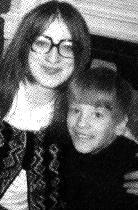
BIG SISTER,
BABY BROTHER
Carole with Howard in The Summer of Love. Photo (& all black & white ones below of Howard) from Anti Diva
Anti Diva begins, and ends, with the same person. One who shows up often along the way: appears, disappears -- from the narrative as if from life, then reappears. At the end he's gone. But not.
Not a name dropped. One held: "The book is dedicated to Howard Pope."
Or, as she so often calls him, "my beautiful baby brother." His first appearance is on just her fifth page.
- "My baby brother, Howard, magically appeared in our lives while we were living somewhere in the depths of Scarborough. ... My parent's quick fix solution to the problems with their marriage was to have more kids. Howard served as a toy for my sisters and me to terrorize. He was cute, with a sweet disposition. We were so awful to him."
In 1967, "during the Summer of Love," Carole reminds us, Celia finally left Jack, taking Howard and sister Elaine back to England. Three years later they returned. Elaine, done with school, set up on her own in a place on Gloucester, across the street from the rooming house where Carole and Kevan then lived.
Celia found a flat in the Annex, Howard with her. Later they'd move to St James Town, the vast low-rent ville radieuse sprawled over blocks (or what used to be blocks) not far from the Popes of Gloucester. There, Carole writes, "Howard liked to lie on the middle of the living room floor, a speaker on either side of his head as he listened to Mott the Hoople. He took Mom to a Lou Reed concert, which she loved."
Howard would live with his mother until she died, age 59, of cancer. As her mother had died, also at 59. "When I dream of her now," Carole says, "she is in her thirties, at the peak of her beauty, standing on the beach at Cape Cod, where we sometimes used to vacation."
- "Howard was especially traumatized by Celia's death. He was only seventeen years old and cast adrift; he would have to leave the apartment they'd shared and fend for himself. He came to my room the day after Mom died. He looked so young and so lost I could hardly bear it. I felt like his sister and his mother."
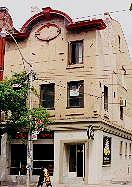
THE BEV
Queen West fan zone in the late '70s; tarted up here in a shot I took in 1999

POPSICLES
Paul Hackney, Tim Guest, Max Agostinelli & "New Wave Nurse" Billy Sutherland as antinormal, shot at the Mercer Union benefit, June 1979 (& made a triptych) by George Whiteside
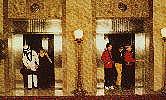
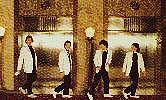
DRASTICS MEASURED
Flip side shot (split in two) from Drastic Measures' 1980 album
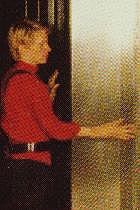
HOW'RD THEN
Elevator boy
(detail from above)
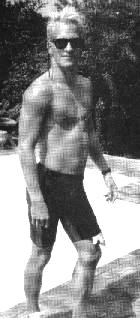
HOWARD LATER
"The most beautiful boy
in New York."
I knew Howard then. If as How'rd, playing with Tony Malone's Drastic Measures in the late '70s. At The Horseshoe at least once: that's where I took the picture of him you saw in my celebration of the Queen West scene -- on stage, a sheet hung behind him sprayed in big letters: "How'rd for Pope." John Paul I had just died, J2P2 not yet launched on the College of Cardinals' puff of white smoke.
More often, much more, I saw him upstairs at The Bev. One night the band came on without him. I asked Tony later, "Where's How'rd?" "Oh, he's with his mum. She's not well."
How'rd didn't know me well, maybe just as the guy usually with that bright, pretty, curly-topped blond Billy Sutherland -- president, I his "confidante," of the Drastic Measures Fan Club. There was no fan club, not officially. But we were hardly alone at The Bev giving the band great whoops as they wrapped each number.
(Billy had fans of his own. He, with Glenn Schellenberg and Paul Hackney of TBA, Max Agostinelli and Tim Guest, were a band: antinormal. Accompanied by keyboard and electronic rhythm ace they looked, a 1979 TBP review said, "like popsicles: cool and synthetic, in pink, yellow and aqua shirts and ties," stitched up by Billy from kitchen J-Cloths, harmonizing to tunes like "My Boyfriend's Back" and "To Sir With Love." At TBP's "Raid!" bash they perfomed with Tony Malone, as The Beds; later they'd do another benefit gig, with The Biffs.)
How'rd and I had little more than hellos. But that was enough, that and the sight of him: compact, trim; that Pope nose in a face clear if not quite set, under a thatch of redblond often spiked. He was usually flying around, in and out as if on some business held to himself. Not scattered. More intent, sometimes tentative; a boy of 17 who might not yet fully know who he was -- but meant to keep what he knew.
He was, if I sensed without quite realizing it himself at the time, incredibly sexy.
Maybe he did know. I hope so. I could have him all wrong; you can do that when you're smitten. That he was Carole Pope's "baby brother" did have its appeal (if in a way "baby" more than "brother") -- but that sort of thing goes only so far. How'rd was a force on his own: his presence; his moves on stage, lit, guitar on his hip. He moved well: subtly captivating; no cock-rocker.
Some of the gaps in what I knew of him Carole has filled in. I barely recalled he'd recorded with those Scarborough boys (How'rd born one), The Biffs. He may have played on Drastic Measures' 1980 album but isn't credited, and not pictured with the band. He's on the other side (neither side strictly front or back, as with many of Rough Trade's record jackets).
It's a very wide shot, taken in the grand Deco elevator lobby of the former Eaton's College Street. The band in white dinner jackets saunter to the right, friends left lean from open cars, taking a peek. Among them: Queen Street legend Nash the Slash in his trademark Invisible Man wrapped head, black glasses, white tux and black fiddle case; and, in an elegant, black, low cut dinner gown, Tony's sister Cathy.
How'rd -- brass topped, uniformed red as an elevator boy -- holds a door.
I think I knew when his mother died. Tony likely told me. I don't recall knowing for sure that he'd lived with her. Anyway, I didn't think much about it, about what his life might be like beyond Queen West and its uptown outpost, the Fiesta. You don't, most often, with visions. They are spirits of a particular place, a scene, a distinct world. A magical one. And How'rd, even then, was magic.
In 1982 Howard (as Howard) moved to New York. "He, like every other cute gay boy in New York," Carole writes, "supported himself by catering and bartending." He also hit the gym, "my slim little brother ... intent on getting a buff toned body, which is sexual currency in the boy world."
Howard did lights for Bernard Zette's Andronyx dance troupe, often at Danceteria, and was later with different incarnations of his band, called Zette. Bernie (not alone) was smitten, remembering Howard as "the epitome of a new wave boy: black pants, white shirt, thin black tie and spiky blond hair." (The way I recall him at the Fiesta.) "He was just the cutest thing."
Club notable and "Wipe Out AIDS" activist Jim Fouratt (who was, coincidentally, in the same January 1984 issue of The Body Politic as Carole) remembers that "for one summer, Howard was the most beautiful boy in New York."
Carole and Howard would go clubbing together: "looking for Mr. Goodbar. We'd start at the more upscale boy bars -- the Saint, the World, the Hellfire Club, the Pyramid -- but the longer the night wore on, the funkier the clubs became. Howard knew every doorman and bartender in town." One of his fondest memories "was getting a blowjob from some chiselled hunk up on the catwalks" at Studio 54.
To stay in the US, Howard married his roommate Elsa, a talented chef. "They were a cute couple" if, Carole also says, one that "had the nagging part of marriage down." The new wave wedding ("their blond hair stiff with gel"; friends, most illegal aliens, "like a bunch of paparazzi," snapping photos) was preceded by "a heated discussion ... about who would wear the leather pants in the family. They both did." Rough Trade often played New York, Howard and Elsa always at their gigs.
- "Howard was our biggest fan, constantly plotting potential career moves. He knew more about us than we did. I'd scan the audience until I saw his expectant face. It was reassuring to have him there. I'd grown closer to him than anyone else in my family."
Sometime after Carole moved to Los Angeles in the later '80s, Howard called to say he had tested HIV positive. "I file all this information away someplace deep inside, and part of me starts waiting for the inevitable to happen."
She later visited him, looking "pale and drained." He was in clinical trials for various drugs, allergic to AZT. "Nothing came easy," Carole says, "for Howard." He'd had enough of New York, soon moving to San Francisco. She also saw him there.
-
"I go with Howard to San Francisco General, which is one of the best facilities in the country for AIDS patients. While Howard gets a check up in his weakened state, he cruises a cute boy in the waiting room. He tells me it helps keep him alive, but I already know that.
"I tell Howard that I'm moving back to Canada for six months, but stress that if he needs me, I'll be there in a heartbeat."

"You know Howard died." Someone said that to me. I dont know when, or even who. I recall the voice, the tone, even the expression on the face -- too common in those days, and that testing line: "You know...." Too often you didn't. My mind casts it as Tony; maybe Glenn. But I don't really know.
- "In the spring of 1996, the unthinkable happened. Elaine called me and said I should get on a plane to San Francisco. I caught the next flight, but I arrived an hour too late. I called from the plane to find that Howard had died in the arms of his three best friends."
At the end of her tales of New York, Carole writes:
-
"It's true that we were all hedonists and narcissists, self-involved and pleasure-seeking, but art flourished and evolved during the cultural renaissance that took place in those years. Stagnant and pop-ish since the sixties, in the eighties art was in-your-face and transgressive, like the graffiti cockroaches of Keith Haring. It seemed like there were all these people with the same mindset who were on the verge of changing the world.
"When I remember the brilliant and beautiful minds I knew back then, I'm filled with unbearable sadness. None of them are here, including my brother. I can't write about Howard's death yet. Sometimes I feel like I'm surrounded by an army of ghosts."
In the end she did write about Howard's death; about Howard. He is Anti Diva's muse: Carole's inspirer, her enabler, casting his light on her life. I think it was her beautiful baby brother, Howard Pope, who bestowed on her the power, and the will she needed, to write her book.
Next: Shocking! Who... me?
Go back to Diva Diaries / Contents page
Or to My home page
Go to Promiscuous Affections / Introduction
Or to specific chapters noted above:
1978 -- for Tim Guest & How'rd Pope
1982, Part 1 -- for Michael Wade & David Roche at Buddy's
This page: http://www.rbebout.com/divas/ddrop.htm
January 2000 / Last revised: June 1, 2003
Rick Bébout © 2001-2003 / rick@rbebout.com